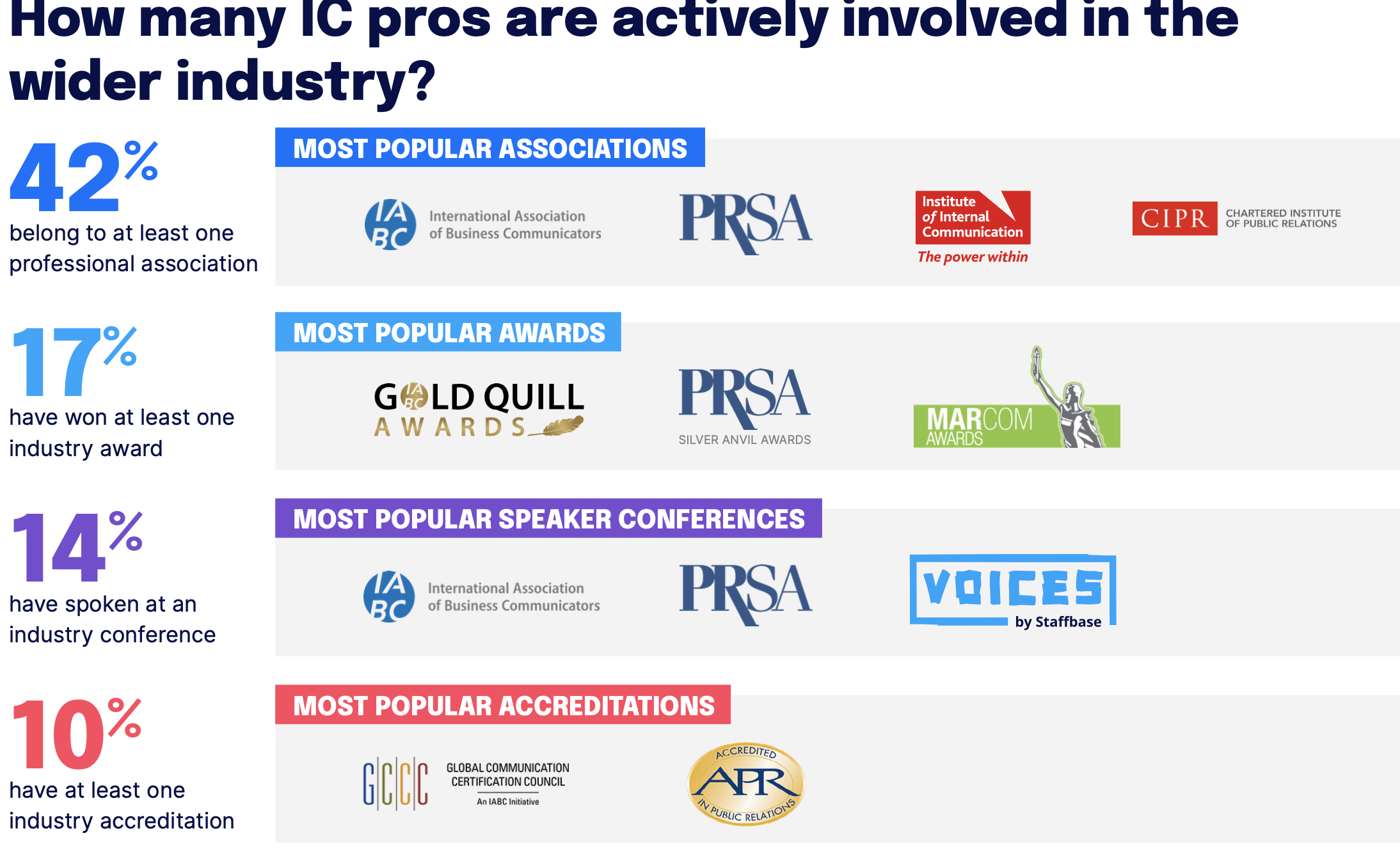When I negotiated my salary for the first time, I was nervous.
I knew that I had delivered on my goals — and exceeded them. And I had a stack of research on other competitors’ salary offerings, as well as data on the industry standard.
Yep, I had enough material to bring to my manager that you’d think I was cramming for a final exam at university.
But if I was so prepared, then why was I nervous about asking for what I deserved?

Salary negotiations are a nerve-wracking experience. On a good day, it’s an awkward dance of you proving your worth and what your employer can offer you.
But now, with economic uncertainty dominating the news cycle, it’s even more complicated. How can you approach the salary conversation when there might be budget cuts? And how can you get the salary you deserve?
We’re here to help you navigate these times of change with advice from salary-negotiating pro and mastermind behind the Internal Communications Salary Report — Kyla Sims, Principal Audience Engagement Manager at Staffbase.
Here’s how to negotiate your salary in uncertain times:
1. Gather the data to make your case for a raise
During that very first salary negotiation, I dug into job postings on LinkedIn and Glassdoor — any site that openly stated salary bands.
At the time, I was a Communications Manager in higher education. And in that particular industry, the salary ranges were usually transparent and posted publicly, so my research was pretty easy.
But then, when I moved into non-profit communications after that higher ed job, I found salaries were a bit more… let’s just say “mysterious.” 😅
So what do you do if you can’t find the ranges for similar jobs?

Well, luckily for you, we have the Internal Communications Salary Report to help with that transparency.
After surveying 1000+ communicators, Kyla and the mighty team at Brilliant Ink — Jackie Berg, Head of Research and Business Development, and Becky Sennett, Vice President of Research — have broken down everything you need to know, including who is making the most money across industries, roles, and responsibilities.
I can’t stress this enough: use the Salary Report as a reference point in your negotiations. It’s credible, and current, and can help your leadership team better understand internal communication salary standards.

In addition to leveraging the Salary Report, Kyla offered some sage advice in this LinkedIn Live deep-dive into the 2022 report: talk to recruiters and go to job interviews.
Even if you are happy with your current position and not planning to move, Kyla explains that these conversations can help you in your salary negotiations:
“It will help you build confidence when asking for what you deserve because the stakes are a lot lower since you have a job.
And of course, [having these conversations] gets you more data. You can ask these recruiters and hiring managers their salary ranges so that you can bring that back [to your salary negotiation].”
This is also a research tactic that is common with communicators who make six figures — something Kyla discovered in the process of interviewing high-earning internal comms pros for The Secrets of IC Professionals Earning $100,000+.
If you’re stuck in salary range limbo, it helps to have hard data to build your case. When you pair that research with conversations in your industry, you’ll be able to clarify the salary range you should be asking for.
2. Lean on your professional network
One of the best things I did for my career was joining my local chapter of IABC (the International Association of Business Communicators).
I immediately had a network of support that I could tap into whenever I had a question or came up against a roadblock… which was often because I was a comms team of one.

In the Salary Report deep-dive, Kyla mentions that IC can be an isolating industry, especially for smaller teams (fun fact: 1 in 4 internal communicators are a team of one). Belonging to a network, she says, can help you feel less isolated as you go through negotiations:
Networking, especially in internal communications, is so important for career growth, for personal growth, for even getting satisfaction out of your job, and feeling inspired.
And you may have an education budget that you can use towards things like events, so you can go and network and meet new people.
As I got ready for that first salary negotiation, being an active member and volunteer of IABC gave me a major advantage.
In my negotiation, I told my director that I was going above and beyond my job description to network with other local communicators — which, in turn, led to partnerships and collaborations that benefitted my organization. I was also able to draw on salary ranges from my peers, which helped me pinpoint the salary I deserved with confidence.
Whether you’re part of IABC, the Institute of Internal Communication, PRSA (Public Relations Society of America), the CIPR (Chartered Institute of Public Relations), these professional networks are key for your career development.
And you’ll be in good company. One of the big findings from the 2022 Salary Report is that 42% of high earners belong to at least one professional association.

Plus, no matter the economic situation, your professional network will always be there for you to lean on. These associations are crucial when you’re job hunting, thinking of a career transition, or want to mentor junior communicators.
So go on and get involved. That membership could be your key not only to your future salary but also to your next big career move.
3. Document and share your accomplishments
I’ve never found it easy to talk about my successes.
As communicators, we’re great at crafting narratives and promoting others’ big wins. But when it comes to our own accomplishments? Well, we’d sometimes prefer to remain behind the scenes instead of under the spotlight.
But here’s the thing: you can turn your accomplishments into a bargaining chip.
How?
Document, document, document.
Take it from Kyla. Here’s her tried-and-true approach:
I have a folder on my desktop called ‘Love and Kudos.’ I screenshot everything. Any time anyone says anything positive to me about anything I've worked on, I put it in there. It's great for year-end reviews. We just had our year-end marketing meeting. And I just filled my slide with the positive feedback I got from people about different projects.
As Kyla says, these aren’t just screenshots. They’re visual proof of the most accomplished moments of your career, ranging from positive feedback from colleagues to successful project launches.
Whether it’s a hard number or KPI (key performance indicator), or positive feedback you received on social or over email, make it a habit to capture your moments of success.

That might also look like measuring your impact with a tool like Staffbase, where you can easily pull reports on stats like mobile app reach, email open rates, intranet engagement, and more.
By sharpening your measurement skills, you’ll give yourself a competitive advantage that will pay off. The 2022 Salary Report reveals that 70% of the top 10% of earners own collecting and analyzing data as part of their job responsibilities.
Measuring, documenting, and sharing your wins will serve you throughout your career. And when you enter salary negotiations, you can demonstrate your value to your manager. Or if you’re on a job hunt in the future, you’ll have some tangible evidence of your success and value to point to in the interview process.
While measurement often falls on the bottom of communicators’ never-ending to-do lists, take this as your sign: you can do it. And it will pay off.
Keep in mind that salary negotiation is a conversation
Now, when I look back on my first salary negotiation, I have learned a lot.
One of the biggest lessons I learned is that negotiation, while intimidating, is actually just a conversation. You’re exchanging information — you bring to the table what you’re worth and your employer replies with what they can offer.
If you’ve done your salary range research, have a network to lean on, and can present your successes, you’ll be more than prepared to make a strong case for a raise.
And even in uncertain times, this kind of salary preparation will show that you’re invested in your career and are aligning yourself with your organization for the long term.
What are you waiting for? Dive into the Salary Report and start making your case.
You deserve it.

Need more salary advice? Want to connect with like-minded comms pros going through negotiations? Join Comms-unity, our global Slack group for internal communicators.
And if you’re craving in-person connection, make sure to join us for VOICES in New York City on April 26 and 27 — it’s going to be a blast and I can’t wait to connect with you there. ✨




